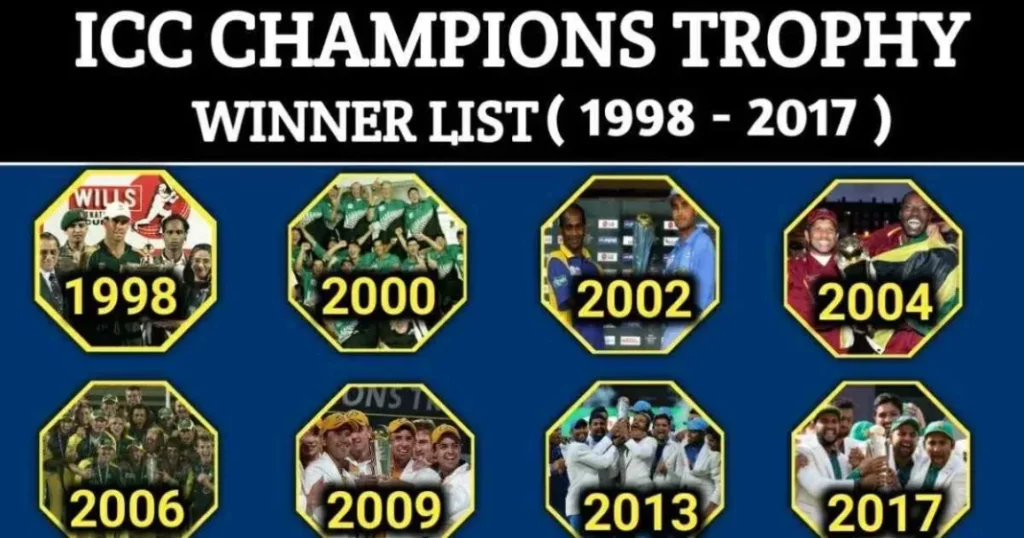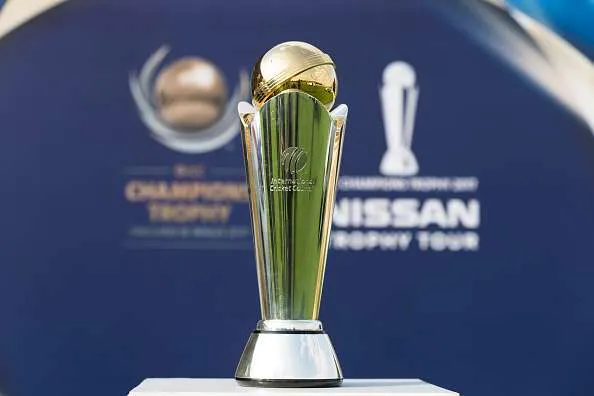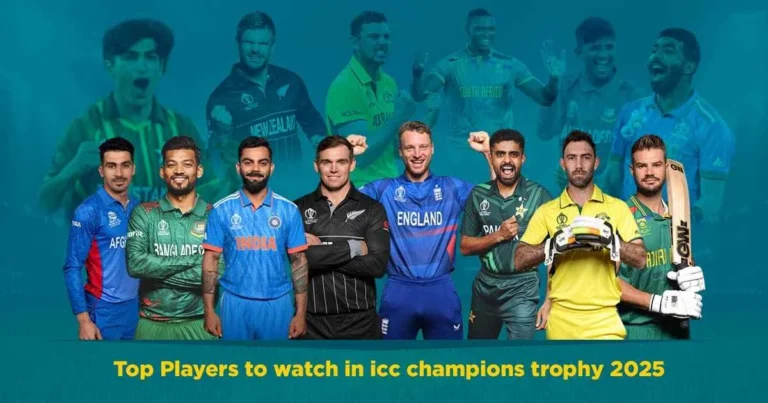iccchampiontrophy2025.com
The History of the ICC Champions Trophy
As the second most prestigious cricket tournament in the world, the ICC Champions Trophy stands out as one of the most prestigious tournaments in the world. Since its inception, it has brought together top cricketing nations, offering thrilling matches and unforgettable moments. This article takes you on a journey through the rich history of the ICC Champions Trophy, from its early days as a knockout competition to its evolution into one of the most anticipated events in the cricketing calendar.
The Beginning of the ICC Champions Trophy
When it was founded in 1998, the ICC Champions Trophy was known as the ICC Knockout Tournament. Its primary purpose was to expand the global appeal of cricket beyond the World Cup, providing another prestigious platform for cricket’s top teams. Unlike the lengthy World Cup, the Champions Trophy was designed as a shorter, high-stakes tournament, making each match more intense and engaging.
Purpose and Inception
- Purpose: To raise funds for developing cricket in non-Test playing nations and offer a competitive tournament outside the World Cup cycle.
- First Tournament: Held in Dhaka, Bangladesh in 1998, with all Test-playing nations participating.
- Format: There was a straight knockout format in which teams had to win every game in order to win the championship.The matches were highly competitive as every game was a do-or-die situation.
First Champions – South Africa
South Africa faced the West Indies in the final of the 1998 edition.
South Africa triumphed by beating the West Indies, becoming the first-ever ICC Knockout champions.
Memorable Moments in the ICC Champions Trophy
Throughout its history, the ICC Champions Trophy has delivered numerous iconic matches, moments, and performances that are etched in the memories of cricket fans worldwide. Below are some of the most unforgettable moments:
2000: New Zealand’s Surprise Victory
The 2000 edition, held in Nairobi, Kenya, saw New Zealand pull off a remarkable upset by defeating India in the final. This was a defining moment for the Kiwis, who had never won a major ICC tournament before.
- Highlight: New Zealand chased down India’s total of 265, with Chris Cairns playing a heroic role, scoring an unbeaten 102. His knock is still remembered as one of the finest in ICC tournament history.
- Significance: This victory marked New Zealand’s first major triumph on the global stage and solidified Chris Cairns’ reputation as a big-match player.
2004: West Indies’ Dramatic Win
In the 2004 edition, held in England, West Indies pulled off one of the most dramatic victories in the tournament’s history, defeating England in the final.
- Final Match: Having set a modest target of 217 runs, West Indies were 146-8 at the end of the day.
- Heroic Stand: A remarkable last-wicket partnership between Courtney Browne and Ian Bradshaw turned the tide, leading the West Indies to an improbable victory. There is no doubt that this stand is one of the greatest last-wicket stands in the history of one-day cricket.
2013: India’s Triumph in Rain-Soaked Conditions
The 2013 ICC Champions Trophy final, held at Edgbaston, England, was shortened to 20 overs per side due to rain. The match proved to be a low-scoring thriller between India and England.
- Highlight: India defended a total of 129 in difficult conditions, thanks to excellent bowling from Ravindra Jadeja and Ishant Sharma. India won the game by just 5 runs, securing their second Champions Trophy title.
- Significance: It is the first time that a captain has won all three major ICC tournaments (World Cup, T20 World Cup, Champions Trophy) under the leadership of MS Dhoni.
2017: Pakistan’s Fairytale Victory
The 2017 ICC Champions Trophy, held in England, saw Pakistan rise from underdogs to champions in one of the most memorable tournaments in cricket history. Pakistan’s victory over India in the final was a defining moment for cricket fans worldwide.
- Final Match: Pakistan posted a daunting total of 338, thanks to a brilliant century by Fakhar Zaman. Mohammad Amir’s devastating bowling then dismantled India’s powerful batting lineup, as Pakistan won by 180 runs.
- Significance: This was Pakistan’s first-ever ICC Champions Trophy win and one of their most memorable victories in world cricket, especially considering they had entered the tournament ranked eighth.
Past Winners of the ICC Champions Trophy
Over the years, the ICC Champions Trophy has seen different winners from various cricketing nations, highlighting the diversity and talent in world cricket. Here’s a detailed list of past winners:
| Year | Winner | Runner-up | Venue | Highlight |
|---|---|---|---|---|
| 1998 | South Africa | West Indies | Dhaka, Bangladesh | South Africa wins first edition |
| 2000 | New Zealand | India | Nairobi, Kenya | Chris Cairns’ 102 not out |
| 2002 | India & Sri Lanka (shared) | - | Colombo, Sri Lanka | Rain-affected final; joint winners |
| 2004 | West Indies | England | London, England | Browne and Bradshaw’s stand |
| 2006 | Australia | West Indies | Mumbai, India | Australia’s first title |
| 2009 | Australia | New Zealand | Johannesburg, South Africa | Back-to-back titles for Australia |
| 2013 | India | England | Birmingham, England | India defends 129 in the rain |
| 2017 | Pakistan | India | London, England | Pakistan’s historic 180-run win |
The Evolution of the ICC Champions Trophy
The ICC Champions Trophy has undergone several format changes and improvements over the years. From its early days as a knockout tournament, it has evolved into a more structured competition, incorporating various innovations.
Knockout to Round-Robin Format
Joint Champions in 2002
The 2002 final, held in Sri Lanka, was memorable for being abandoned twice due to rain. Both India and Sri Lanka were declared joint winners, marking the only instance in ICC history where a major event had two champions.
Introduction of DRS in 2013
The 2013 edition saw the introduction of the Decision Review System (DRS), aimed at minimizing umpiring errors and ensuring fair play. This technology became an essential part of modern cricket, helping teams challenge incorrect decisions.
Power Plays and Other Innovations
Over the years, innovations such as Power Play overs, where fielding restrictions are applied, have been refined to make the matches more thrilling and tactical. These changes added to the excitement and unpredictability of the tournament.
Impact of the ICC Champions Trophy
The ICC Champions Trophy has had a profound impact on international cricket, not only in terms of competition but also in shaping future stars and building rivalries.
A Platform for Emerging Players
Many cricketers have used the ICC Champions Trophy as a platform to announce their arrival on the global stage. Players like Rohit Sharma (India, 2013) and Hasan Ali (Pakistan, 2017) were key performers in their teams’ respective triumphs and went on to become household names.
Intensifying Rivalries
The Champions Trophy has also played a significant role in intensifying rivalries, especially between India and Pakistan. The 2017 final between the two sides was watched by millions around the world and is often regarded as one of the most anticipated matches in cricket history.
Looking Ahead to the ICC Champions Trophy 2025
Pakistan will host the ICC Champions Trophy 2025, which is already awaited by cricket fans.This will be the first time Pakistan hosts the tournament, and expectations are high for an exciting and well-organized event.
Pakistan’s First Hosting
- 🏆 Original Format: The first few editions (1998-2002) were played as straight knockout tournaments.
- 🔄 Round-Robin Format: From 2006 onwards, the tournament adopted a round-robin format similar to the World Cup. However, only the top eight cricketing nations were invited, making every game highly competitive.
High-Stakes Competition
As the top cricketing nations gather in Pakistan to compete for the trophy, the 2025 edition promises to be another thrilling chapter in the history of the ICC Champions Trophy. With a rich tradition of high-quality cricket, the tournament is expected to captivate fans once again.




